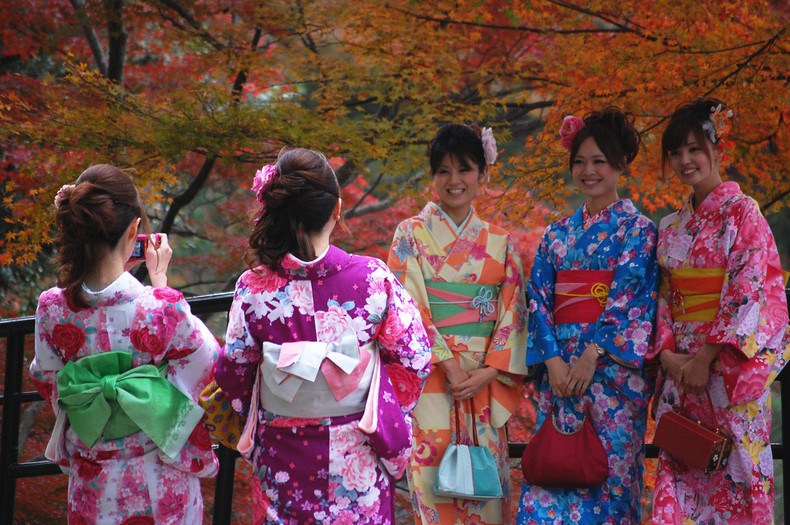It is undeniable that Japan is a rigid, collective and perfectionist country that presents both good and bad examples to the world. In the midst of all this, women receive a lower salary than men, which generates controversy around the world and on social networks. So are women looked down upon in Japan?
Another issue that can belittle women in Japan is the high exposure of sexual content in the media. Are Japanese women really safe in Japan? Are they victims? Are they treated as they deserve? We are going to discuss several subjects in this article.
Unfortunately, Japan is above 100 in the ranking of 144 countries on gender equality (Brazil is close to 100). No developed country in the world is as low as Japan, although South Korea is in the worst position.
Many countries in Asia are in the worst positions when it comes to gender equality. Of course, this ranking doesn't just look at salaries or opportunities, but several factors that make us think. But let's not consider this ranking as something absolute!

Table of Content
Are Japanese Women's Salary Really Lower?
The simplest and shortest answer is yes! Women usually earn up to 27% less than men. However, some research claims that the pay gap is not in the gender itself, but in a number of other factors that we are going to examine.
A certain researcher said that sexism is the least of the Japanese problems, the Japanese consider hierarchy much more important. This Hierarchy puts a big wall between women, which makes it difficult to grow in the job market.
The same researcher states that despite the stark differences in salary between men and women, Japan, paradoxically, is a country with more equal pay than the US. This is because everyone in the same hierarchy receives the same salary.

Since childhood the Japanese are taught about equality between positions, they do the same tasks and receive the same rewards, but there will always be those of higher level with greater prominence and greater reward.
In the US we hear rumors of women in the same positions being paid less than men. In Japan, this would be considered a major insult, a scandal, or something illegal. Unfortunately, this must happen on the sly, especially among foreigners and factories. I have no doubt that authorities turn a blind eye to certain cases.
The excuse for these occurrences is that women's work is lighter, has a shorter workload, or requires less effort. Maybe a company makes this excuse in the contract to pay a lower salary, but in practice women end up doing services at the same level as men.
Simply put, in Japan there is a gender inequality that is covered up with lame excuses that women's work is different from men's.

The mentality that women are housewives
Although most women in Japan work, what makes promotion and a high position difficult is the possibility for a woman to have a child and give up work. Which makes men dominate the hierarchical system in large numbers.
It may seem silly, but culturally the japoneses usually do not hire maids to take care of their home, the woman takes on the full role of a housewife, with the help of her husband (if she has one). Perhaps this is one reason why women work in lower-paying jobs.
Companies also offer jobs already specifying which gender they want to hire. It may seem absurd, but they don't have the slightest bit of shame in specifying roles for a particular gender along with salary in job advertisements. Especially in contractors!

Of course, there are those women who excel in the office, who manage to develop a good career and high position. Most of the time it is a single woman who has enormous authority in the workplace.
Contrary to what many imagine, Japanese women are not docile and fragile. In many ways they are stronger, more persistent and more influential. Most women are graduates, and about 77% of part-time jobs are held by women.
Harassment and sexual abuse of women in Japan
Statistically speaking, Japan is among one of the safest countries for women. The chances of a woman being sexually abused are 27x higher in the US or 100x higher in Brazil.

We should not rely on statistics, because most cases are not reported to the police. Especially in Japan, where reputation is important, so many women end up hiding this fact.
Many cases of groping happen in Japan, in schools, work, trains and on the street. It is not uncommon for strange men to appear inviting random women to a hotel offering a lot of money. Many bizarre cases involving perverts happen in Japan, but most of the time nothing worse happens.
Generally the Japanese are extremely pacifist and do not like any kind of conflict, which makes it easier for predators. There's no need to be afraid, as for every bad man, there are thousands of decent men. Japanese women are aware of this and have developed their own techniques to ward off perverts.
The Japanese are aware of these problems, especially those that occur on trains. You may even encounter posters alerting women about these perverts who grope, strongly encouraging them to shout Chikan if this happens. Fortunately, there are women-only cars.

The women of Japan have won their place
Throughout history Japanese women have been treated in different ways. As in any country at war, women were abused and treated as objects. Unfortunately, Japan spent much of its history in constant wars, which made women suffer throughout history, making them stronger.
The participation of women in Japanese society has varied greatly over time and depended heavily on hierarchy and social class. Prostitution was a quite common business, over time women gained significant prominence making art instead of selling themselves, becoming gueixas.
In the Heian period women became emperors, could own property and be educated. Even so, arranged marriages without mutual love were common. Things only got better for women after the second world war.

Some women stood out, such as the famous author Ichiyo Higuchi who had her face on the 5000 yen note. Asako Hirooka was a businesswoman, banker, and even founded a college.
Japanese women over time gained worldwide fame for following standards of modesty, neatness, courtesy, conformity, and self-reliance.
There are many other points to make about women in Japan. They play an important role in Japanese history and society. Although Japan has looked down on women in the past, nowadays they hold the power in their hands.

Unfortunately, gender inequality occurs worldwide, just like racial issues and those of different social classes. Japanese women overcome challenges and fight for their goals instead of lamenting the situations.
Complaining is not part of Japanese culture, one of the main reasons for success is to act instead of complaining. What do you think of this matter? Complement the article with your comments and share with friends.
